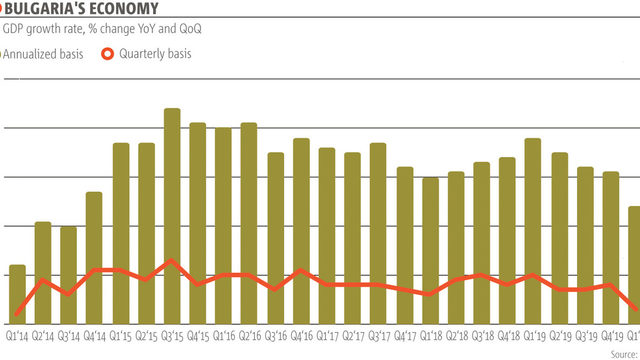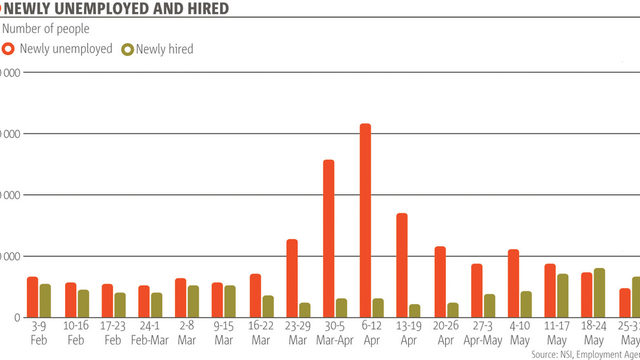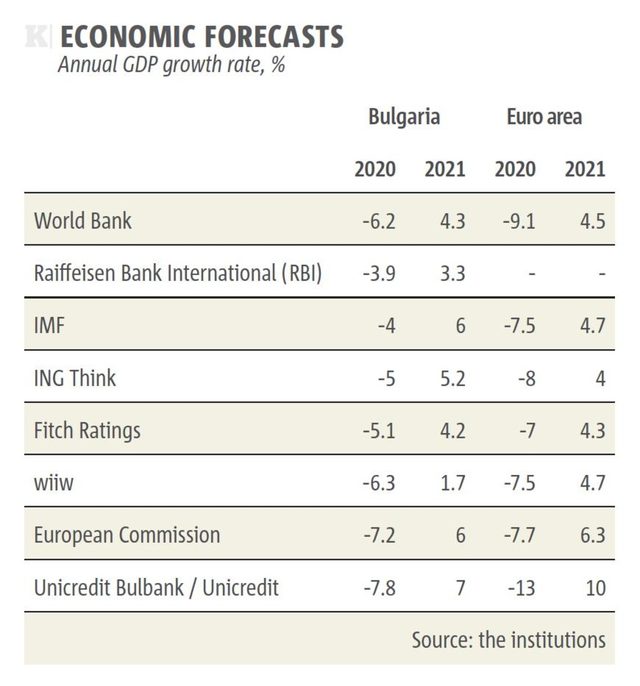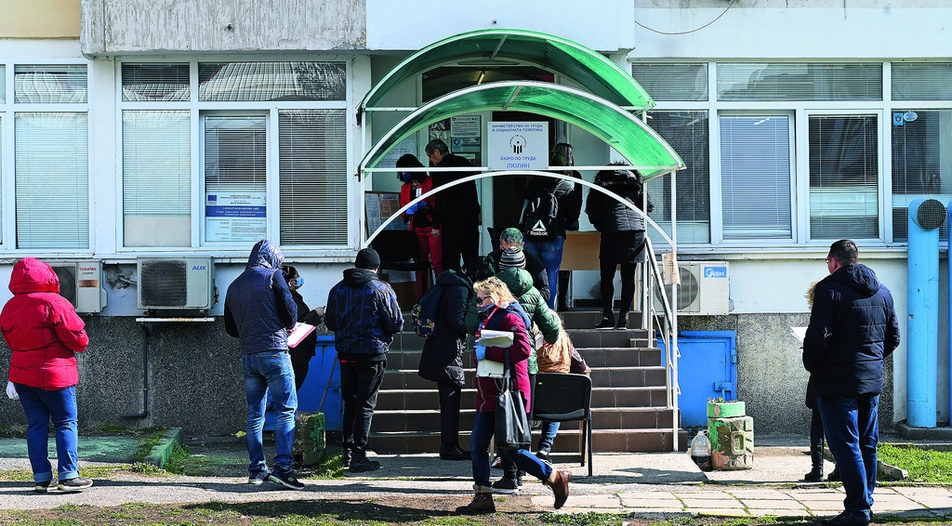After weeks of doom and gloom forecasts and media reports of record-breaking declines in business activity, European countries finally have real data to base their economic assessment. The economic growth numbers for the first quarter of 2020 show the scale of the coronavirus crisis, though only in its initial stage. The restrictive measures imposed in mid-March to contain the spread of the disease plunged the European Union into the worst recession in a decade, and most likely in history, with a 3.2% decrease in the gross domestic product (GDP) on an annualized basis.
So far, major European countries like Italy, Spain, France and Germany, where the restrictions were stricter, have taken the hardest blow. On the other hand, Bulgaria posted a 2.4% growth on an annualized basis in the first quarter. Even though the growth rate is the lowest reported in the past six years, it's also the third-highest in the EU following Romania's 2.7% and Lithuania's 2.5%.
However, the positive result is not a reason for the countries in the lead to lower their guard. The slowdown is the result of only two weeks of restrictive measures imposed on local and European businesses. Undoubtedly, the impact of the novel coronavirus disease (COVID-19) will be far greater in the second quarter. The good news is that governments are already loosening restrictions and businesses and consumers are timidly returning to some form of normalcy but the real recovery still seems far away. Currently, projections are set for 2021 if there is no new strong wave of the epidemic by the end of the year.
Just two weeks
Economic output in the Eurozone fell by 3.2% year-on-year in the first quarter, while in the EU the decline was 2.6%, according to Eurostat data. Italy, France and Spain report a contraction of over 4%, and Germany - by 2.3%. This is the worst performance of the European Union in terms of GDP growth in the last decade.
Against this background, the numbers for Bulgaria seem, at first glance, encouraging. According to the initial estimates of the National Statistical Institute (NSI), the local economy grew by 2.4% on an annualized basis in the first quarter. Government and household consumption contracted very little in comparison to the last three months of 2019, by 0.1%, and the annualized growth rate fell to 4.1%. Imports and investments decreased but the decline has been visible since the end of last year.
Thus, one can say that Bulgaria ranks among the least affected by the initial shock wave. However, a look at past quarters shows that this is the weakest economic growth in the country since the summer of 2014. As early as March, industrial activity decreased by 6.9% on an annualized basis. Machinery and equipment manufacturing fell by 21.1%. Automotive production shrank by 17.5%, light industry sectors posted a decline of over 25%. Consumer electronics retail sales fell by over 40%, and sales of clothing and footwear slumped by 63%.
Estimates in the first quarter hint at the numbers awaiting Europe and Bulgaria in April-June. "If today's data are the result of two weeks of lockdown, three more weeks of lockdown and a very gradual lifting of some measures do not bode well for the second quarter," says Carsten Brzeski, chief economist at London-based think-tank ING Think.
The April lockdown
One of the most visible indicators of economic turmoil is the labour market. In just two months, the restrictions on business activity in Bulgaria sent nearly 83 thousand people to employment offices across the country. The total number of newly registered unemployed reached 131,500. In comparison, in the same period of 2019, the total number was 41,400 people.
The good news is that the peak of new unemployment registrations passed in the second week of April with nearly 10,000 people signing up in a single day. At the same time, the number of newly hired people is growing - from about 2,000 people per week in April to over 7,000 in May. The second half of May even saw a drop in the total number of unemployed after new hires topped those newly registered in employment offices.
Unfortunately, not every economic sector is recovering. For example, layoffs at hotels and restaurants account for over a third of the total number of newly unemployed workers in the period between mid-March and mid-May. They, however, have no prospects for a strong summer tourism season and may stay unemployed for a longer period. "Tourism has no chance to recover to even a quarter of its usual summer season revenue if it relies entirely on Bulgarian tourists," warns Adrian Nikolov of Sofia-based think-tank Institute for Market Economics (IME).
A stumbling block in the foreseeable future is also set in the government's current macroeconomic framework for 2021 in which the minimum wage is set to increase from January 1 by 40 levs to 650 levs (332 euro). "Currently, many companies are going through deflation - their production is getting cheaper. Thus, the real cost of labour for the company increases and maintaining the current number of employees becomes more difficult," said Georgi Stoev, manager of Plovdiv-based think-tank Trakia Tech. "If the macroeconomic framework remains unchanged by the end of the year, the increase in the minimum wage will definitely lead to a reduction of jobs that require low-skilled labour," Stoev added.
Companies' reluctance regarding wage growth is already visible. As early as January-March, average wage growth slowed from double-digit rates in 2019 to 5.9% on an annualized basis. Several sectors already report a decline in remuneration - hotels and restaurants, entertainment and sports, and mining. In general economic theory, a slowdown in wage growth leads to a decrease in household purchasing power and, consequently, final consumption, which has been the main engine of Bulgarian economic growth in recent years. If companies do not feel confident that they can afford higher wages for their employees, consumption and economic growth will remain depressed for a longer period.
The recovery timetable
All of this suggests that the growth rate achieved in January-March is by no means a guarantee that the economy will sail smoothly through the crisis. So far, there have been no positive updates on economic projections. The most optimistic forecast belongs to the Bulgarian Ministry of Finance, which bets on a GDP decline of 3% for 2020, whereas global rating agency Fitch, Dutch bank ING, the European Commission, the Vienna Institute for International Economic Studies (WIIW) and local UniCredit Bulbank all expect a contraction of the Bulgarian economy of 5-8%. Few are betting on a quick recovery in 2021.
But there is good news for some sectors like retail. For example, Google data shows that people's activity increases with the easing of confinement measures. In Bulgaria alone, almost all restrictions were lifted in the first two weeks of May. Malls, gyms, parks, shops, restaurants and other sites are now open. According to Google, as early as May 9, visits to retail outlets began to recover, reaching about 70% of the January average. Business sentiment in industry and construction improved in May, according to national statistics, even though the current financial situation of companies remains bad.
Some manufacturers have also started to see light at the end of the tunnel. The local automotive industry, which is part of global and European supply chains, was among the first to feel the strain at the beginning of the state of emergency declared in mid-March but managers expect recovery at the beginning of the second half of 2020.
However, other sectors are still facing a possible drop in orders. An example of this is Bulgarian machine-building companies with their own developments, which are still working on projects ordered and paid for months ago. "The problem for these companies will arise when new orders cease. Which is expected to happen at the beginning of this summer," said Georgi Stoev.
And all of these projections are made under the best-case scenario assuming that the easing of restrictions is kept under control by governments and monitored by health authorities to the extent that it prevents further waves of new infections and a return of curbs on economic activity.
| The long-term chance Against the backdrop of many gloomy forecasts, the crisis also brings opportunities for the Bulgarian economy. The onset of the epidemic in China and the effect of locked down factories on global supply chains have put diversification on the agenda. For Bulgaria, this is a chance to attract a new wave of investors who rely on smaller, more scattered and diversified plants. The process may take years. And if the country wants to take advantage of the situation, the government must demonstrate stability and predictability - things that have recently begun to crack with ill-considered cuts in the VAT rate that could destabilize the entire tax system. "The problem is that Bulgaria is competing with locations where business conditions are significantly better in the areas that employers are interested in - the regulation of employment contracts, social insurance conditions, sick leaves," said Georgi Stoev. "Loosening of regulations and restrictions on the labour market is important," he adds. This would require additional efforts by the government to ease business conditions in order to achieve better long-term prospects, even if only to secure future employment. |



After weeks of doom and gloom forecasts and media reports of record-breaking declines in business activity, European countries finally have real data to base their economic assessment. The economic growth numbers for the first quarter of 2020 show the scale of the coronavirus crisis, though only in its initial stage. The restrictive measures imposed in mid-March to contain the spread of the disease plunged the European Union into the worst recession in a decade, and most likely in history, with a 3.2% decrease in the gross domestic product (GDP) on an annualized basis.
So far, major European countries like Italy, Spain, France and Germany, where the restrictions were stricter, have taken the hardest blow. On the other hand, Bulgaria posted a 2.4% growth on an annualized basis in the first quarter. Even though the growth rate is the lowest reported in the past six years, it's also the third-highest in the EU following Romania's 2.7% and Lithuania's 2.5%.












